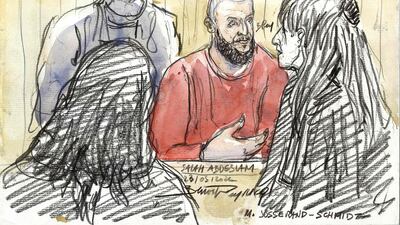French prosecutors hope their closing statements in court over the November 2015 attacks in Paris that killed 130 people will lead to lengthy prison terms for those accused.
In the dock is Salah Abdeslam, the only surviving member of the extremist attackers who opened fire in a packed Bataclan concert hall and on cafe terraces in nearby streets.
Suicide bombs had earlier been detonated at the Stade de France stadium — where the national football team were playing Germany in front of a huge crowd — as part of a highly organised and synchronised attack that left more than 100 people in critical condition.
Also on trial in Paris are 19 others accused of assisting the killers. Twelve, including Mr Abdeslam, could be sentenced to life in prison, the maximum punishment under French law.
The trial, centring on the worst terrorist attack on French soil, on Wednesday heard the beginning of the closing arguments by the three leading prosecutors in the case.
For three days, they will give their version of the events of November 13, 2015 that traumatised France and beyond.
The prosecutors will then lay out their assessment of the guilt of each of the accused, before recommending sentencing on Friday.

"What will we remember from this trial?” Camille Hennetier asked in her closing remarks in the trial that started in September 2021. “What images? What words?
"Your verdict, of course. And the names of the dead that were read out in September. The testimony of the survivors. And finally, without a doubt, the cruelty of the terrorists who fired again and again and took pleasure in killing."
The length of the trial, its emotional charge and the number of plaintiffs – 2,500 – have made one of the most intriguing legal proceedings in French history.
Six suspects are being tried in absentia, including five leading ISIS members presumed dead in Syria.
The questioning aimed to establish how the attacks were planned and carried out, "but much remains in the dark", Ms Hennetier said.
"The answers are here in the dock,” she said. “Most of the accused know. They know everything and have never spoken and probably will never answer," but prosecutors are going to "put together the puzzle".

Mr Abdeslam, a Frenchman, 32, who was arrested in Belgium after five months on the run, kept silent during the initial police investigation but began talking when the trial started, apologising to the victims' families and explaining how he gave up plans to blow himself up.
But his tearful appeal for forgiveness had little effect on the prosecutors, who reject that he changed his mind about the attack and say his explosive belt simply malfunctioned.
They dismissed Mr Abdeslam’s claim of being recruited by an extremist cell only days before the attacks as "strange" and "illogical".
Closing arguments by the defence lawyers start next week, with the verdicts due on June 29.


